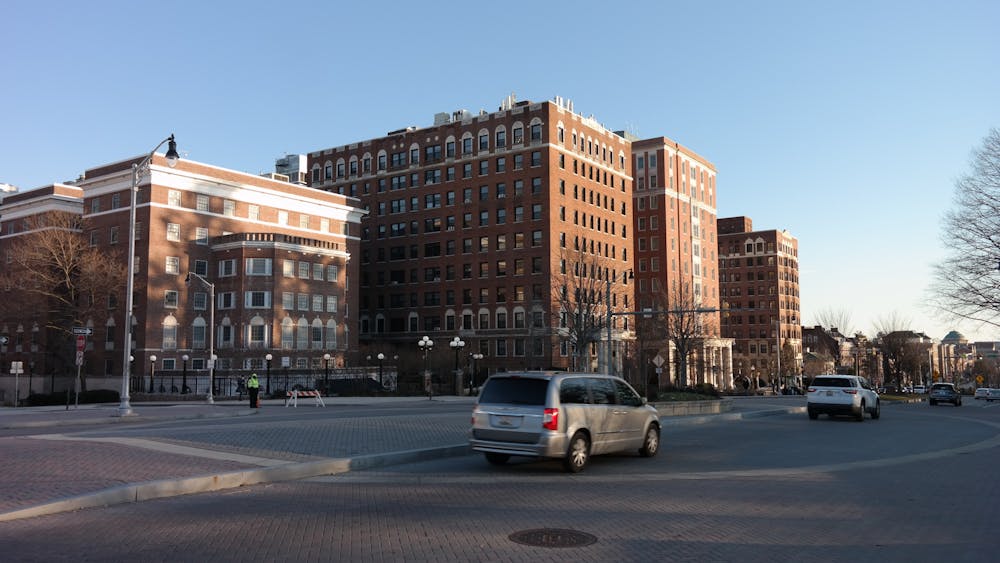This semester, University housing reopened for freshmen and sophomores for the first time since students were sent home at the beginning of the COVID-19 pandemic.
Wolman Hall, Charles Commons, AMR II, Homewood Apartments and Bradford Apartments have all opened for residential use. McCoy Hall, AMR III Building A and the Inn at the Colonnade are currently being used as quarantine and isolation housing for students who have tested positive or were exposed to COVID-19.
Previously, only students who could not return home due to travel restrictions and those with demonstrated need were allowed to live on campus.
Suite-style dorms come with a kitchen and sometimes a common seating area, and the University has provided residents of AMR II — a traditional style dorm — with a microwave and fridge.
All AMR II residents live alone in their dorm rooms. Residents of other buildings, which have suite-style floor plans, have anywhere from one to three suitemates. Students are encouraged to practice social distancing and use masks within their suites. Hopkins has also implemented additional cleaning procedures.
Freshman and AMR II resident Cierra Gladden stated that she enjoys living alone and feels safe sharing the facilities in her dorm.
“There aren’t a lot of people to begin with in AMR II, so none of the facilities are ever crowded,“ she said. “The custodial staff has also done a great job with keeping the bathrooms clean.”
There is a no-tolerance policy for visitation in all dorms. Several students have been removed from University housing for non-compliance.
Gladden acknowledged the difficulty of complying with the rules.
“The ban makes a little less sense in AMR II, but I still don’t mind it,“ she said. “The worst part is it can sometimes feel like you’re doing the wrong thing by being here because it gets lonely, and it’s very tempting to gather in groups, especially seeing people over in other dorms. But at the end of the day, I put safety above all else.”
Sophomore Michael Hallahan, a Bradford Apartments resident, described similarities between his current experience and dorm life before the pandemic.
“It’s different, but a lot has stayed the same. In my own dorm with two other roommates, we’ve had plenty of experiences to enjoy quality time with one another. We’ve done poker nights and watched the Super Bowl together,” he said. “The only thing that’s been missing is the inability to have friends over from other dorms, but there have been ways to work around that. I’ve done plenty of social activities and online games over Zoom.”
Freshman Sanya Bawa, who lives in Charles Commons, believes the policy is too restrictive and sets an unrealistic expectation.
“People want to meet each other and there’s nowhere to do that, especially since the weather is so cold,” she said. “Now people are meeting up at restaurants and endangering the community at large, which seems even more unsafe than if they were to meet in a dorm room.”
Some peer universities have adopted less restrictive policies. At Brown University, for example, students are placed into pods of six people they can meet unmasked. Students at the University of Illinois at Urbana-Champaign are permitted to have one residential student visit their dorm room at a given time.
Bawa believes that Hopkins should relax some of the current restrictions, like other schools have done.
“These policies have been very successful and there is a very low positivity rate at those schools,” she said. “I think people would comply with these policies and not need to resort to other activities.”
In an email to The News-Letter, Assistant Vice President of External Relations for the Office of Communications Karen Lancaster stated that the University will maintain the current restrictions.
“Our COVID-19 protocols are determined with the health and wellbeing of our entire community as the top priority, and are informed by unparalleled public health expertise,“ she wrote. “The restriction on guests limits opportunities for the spread of the virus.”
Freshman Asha Shetler agrees that the lack of socialization is difficult, but she nevertheless supports the policy.
“It's for the greater good. It would be really nice to go into other people’s rooms to meet people, but, given the situation, that is the best option,” she said. “People are being more cautious now compared to the beginning of the year.”
Residential Life continues to offer various in-person and online residential programs with help from Residential Advisors (RA).
Bawa appreciates the efforts made by her RA to build a community among residents.
“My RA consistently has events, some of them online and others where you can stop by and grab something from her room,” she said. “The little things like that keep everyone engaged, so I have a connection with people on my floor and can say hi when I see them around.”
Gladden believes that while the dorm situation is not ideal, she has enjoyed her time on campus so far.
“From a top-down view, it can feel like we’re all stuck and not allowed to do anything fun or make friends. But we still have to consider that we’re in a city, not a contained bubble,” she said. “Considering the circumstances, what we’re allowed to do is still a pretty good time. I’m very grateful for what campus has brought me.”
Chris H. Park contributed reporting to this article.

















